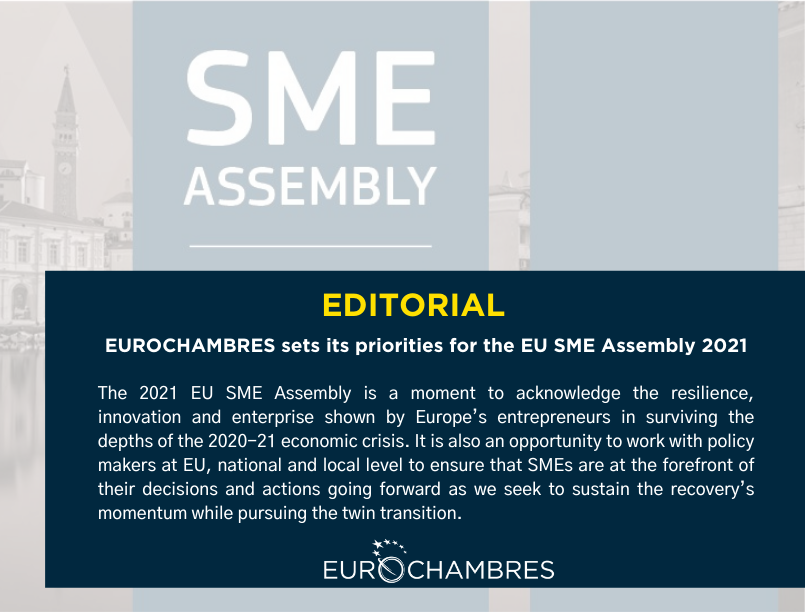Eurochambres sets its priorities for the EU SME Assembly 2021
As the world gradually recovers from the depths of the pandemic, small businesses are trying to rebuild and recalibrate in a way that prepares them for future shocks and strengthens their competitive position. The recovery of Europe’s economy and our transition to a sustainable economy must be pursued in a mutually beneficial manner and this should be at the core of the 2021 EU SME Assembly in Slovenia from 15 to 17 November.
The 2022 EUROCHAMBRES Economic Survey launched last week, based on responses from nearly 52.000 businesses (90% SMEs) across Europe, shows that optimism and confidence are rising among entrepreneurs. This momentum remains fragile though, with affordable access to energy and raw materials, as well as the lack of skilled workers and rising labour costs highlighted in the survey as major concerns among businesses for next year.
Going green and digital are both a survival imperative and a business opportunity. Reaching net zero GHG emissions across the entire value chain under current conditions would be very difficult for most SMEs. Even when the green business case is compelling, but particularly when it is not, SMEs need tailored and clear energy transition policies that incentivise investments in renewable and low carbon energy and hydrogen-based technologies. Related plans to introduce mandatory corporate due diligence should ensure that this obligation does not cause or create additional burdens/costs for SMEs, especially those that are part of large undertakings’ complex supply chains.
COVID-19 has accelerated the digital transition and favoured some forms of innovation and entrepreneurship. There is mounting evidence and examples of SMEs integrating new digital practices and tools in their operations, but they will require ongoing support to unlock the full potential of digital technologies.
Financing and investment are critical elements in the twin transition. SMEs must therefore be at the core of national Recovery and Resilience Plans. We also need to develop the European capital markets ecosystem to promote and diversify small and innovative companies’ access to finance beyond bank lending. Greater focus on financial instruments such as quasi-equity, hybrid schemes and convertible loans is crucial, in addition to the role that business angels and institutional investors can play.
Market access is vital to the economy and to a sustainable European recovery, yet only one in four SMEs currently trades within the EU; many more would be inclined to so if persistent administrative and legal barriers were removed. SMEs also encounter disproportionate obstacles in trying to access international markets. The EU must forge closer links with global growth centres and focus on trade measures that deliver benefits to our SMEs. At the same time, the implementation of our existing trade agreements becomes ever more important, and we must find more effective ways to bring trade closer to smaller businesses.
More than 93% of the European chamber network’s members are SMEs. That is why we continually advocate for a more SME-friendly regulatory and policy environment . EU officials and politicians must carefully evaluate the implications of relevant legislative initiatives for SMEs and alleviate unnecessary regulatory burdens that may jeopardise the recovery process. While we work closely with the Commission and other institutions to in pursuing this objective, the ongoing delay in appointing an EU SME Envoy – announced two years ago by President von der Leyen - raises concerns about how the ‘think small first’ principle is being applied and enforced.
The 2021 EU SME Assembly is a moment to acknowledge the resilience, innovation and enterprise shown by Europe’s entrepreneurs in surviving the depths of the 2020-21 economic crisis. It is also an opportunity to work with policy makers at EU, national and local level to ensure that SMEs are at the forefront of their decisions and actions going forward as we seek to sustain the recovery’s momentum while pursuing the twin transition.
